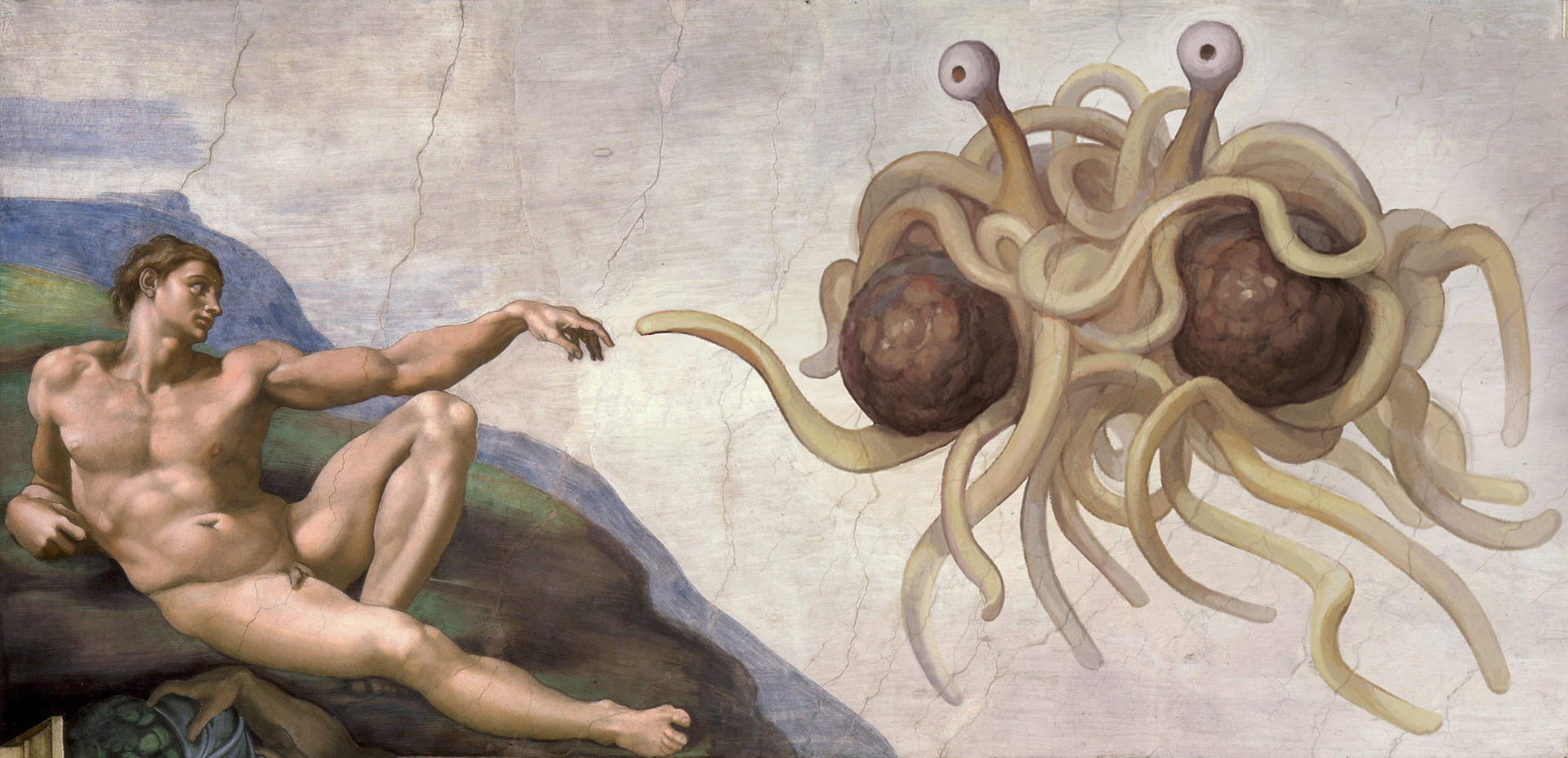
Pastafarians and the Jesters
- By Sam Field --
- 21 Sep 2019 --
 To become a Catholic Priest or a Jewish Rabbi requires years of training and study. To become a Buddhist Monk one must give up gainful employment and all worldly possessions, take a vow of chastity, and engage in years of meditation and study.
To become a Catholic Priest or a Jewish Rabbi requires years of training and study. To become a Buddhist Monk one must give up gainful employment and all worldly possessions, take a vow of chastity, and engage in years of meditation and study.
To become a minister in the “Church of the Flying Spaghetti Monster,” however, one merely pays $34 and puts a colander on his or her head.
Is this a joke? Yes and no.
In 2005 Pastafarianism or “The Church of the Flying Spaghetti Monster” arose as a satirical alternative to teaching of intelligent design in Kansas public school science classes, and rapidly gained notoriety on social media and the Internet.[/tweetit]
Recently, the Kenai Peninsula Borough of Alaska enacted a policy that required invocations be given only by “official organizations with an established presence on the Kenai Peninsula.” The ACLU sued, and as a result a Pastafarian gave the invocation at a local government meeting in Homer, Alaska, wearing a spaghetti strainer on his head.
The Pastafarians, the Satanic Temple and other such organizations can be seen from several viewpoints. Members may be revolting against organized religion, be people who dislike religion, who would like to claim religious benefits or strike back at a perceived breaking of the separation of church and state, who wish to ridicule religion or simply wish to have some fun at the expense of what they see as crusty backward institutions.
It is ironic that “anti-religious religions” are asking for – and in some cases being given – the same rights as other religious groups. Depending on ones’ point of view, they are hilarious, hideous, blasphemous or any number of other adjectives.
Religious belief transcends the weighty reality of the material universe, and for those to which only matter is real, religion is a fake, a scam, an “opium of the people” as Marx termed it. So those who, like trees, are “so packed in matter that they may never achieve Krishna Consciousness”— as one Hari Krishna member told me – may attack that which they reject. And those attacks can range from the Holocaust on one end of the spectrum, to irony and ridicule on the other.
There is a positive note and a context to the ridicule, sarcasm, and irony regarding matters of faith, however, and it comes from the Middle Ages.
Many years ago, I was visiting an 11th Century Church in Lund, Sweden, with Gunnar Sjoholm, a relative who was an official in the Swedish Lutheran Church. As we stood talking, a teen-ager ran in and began shouting angrily. Instead of becoming angry himself, Gunnar began to calmly translate what the man was saying. The man was insulting the church, church officials even God himself.
I was surprised at how calm Gunnar remained, and after the teenager ran out, he told me that making fun of established institutions was the job of the fool, or court jester in the Middle Ages. The jester – unlike other subjects of the king – had freedom of speech specifically granted by the king. So the jester could joke about the church, government officials, even the royal family itself, without fear of punishment. The man – whether he knew it or not – was following a very old tradition, said Gunnar. And Gunnar, who had been a missionary in China before the revolution, prized both freedom of speech and of religion.
A jester, he said, may inspect and reevaluate the things one valued most. His ability to put such an act in historical context, to understand it as more than hate and to not condemn or lash out was something I found inspiring.
I find that viewpoint very rational and grounded, a very good approach for dealing with those who do not understand belief and who criticize, ridicule or denigrate religions, religious institutions and individuals. It is an opportunity to inspect ones’ beliefs and ideas, reevaluate priorities and rededicate oneself to helping those who will accept help and who yearn for something better than the material plane of existence.
Gunnar passed away years ago, but I think were he to hear of the Pastafarians, he might have a good laugh and perhaps gain a bit more insight into his own beliefs.


















